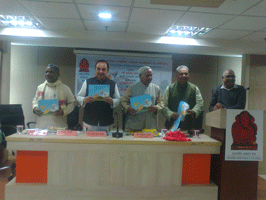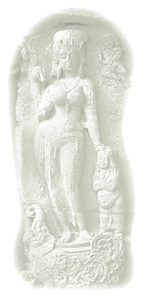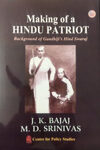REPORT ON BOOK RELEASE FUNCTION OF NOVEMBER 24, 2011 Centre for Policy Studies latest publication, “Scheduled Tribes of India: Religious Demography and Represenation”, was released at a well-attended function held at the Deendayal Research Institute at Delhi on November 24, 2011. Sri Karia Munda, Deputy Speaker of the Lok Sabha, presided over the function. Sri Subrahmanyam Swami presented the keynote address. Sri Dilip Singh Bhuria, former Chairman, National SC/ST Commission and Sri Jagdev Oraon, Chairman, Vanavasi Kalyan Ashram were the special guests. The booklet compiles data on the religious composition of the Scheduled Tribes populations in the Northeast and in the three states of central India, Chhattisgarh, Jharkhand and Orissa, and gives the figures for their relative representation in the central services, especially the Indian Administrative Service. The data indicates an extraordinary asymmetry between the Northeast and the Central Indian states, and between those ST who have converted to Christianity and who have remained steadfast in their religion. According to the data collected in the book, the Northeast accommodates about a crore STs, nearly half of whom have converted to Christianity. And there are 130 ST IAS officers from the Northeast in the Civil List, of whom 105 are Christian. Chhattisgarh, Jharkhand and Orissa on the other hand accommodate about 2.2 crore STs of whom only 7-8 percent are Christian. And, the representation in the Civil List of this ST population from this region is only 17 officers, of whom 8 are Christian. The data seems to indicate that the constitutional privileges in favour of the STs have become a means for accommodating a large number of Christian converts in the IAS and other central services. This extraordinarily skewed representation of the Christian STs was summarised by the author of the booklet, Dr. J. K. Bajaj. Sri Subrahmanyam Swami in his keynote address said that the work of the Centre has always been comparable with that of the major international universities, both in its authenticity and presentation. Therefore, when the Centre points out such a major asymmetry between the representation of Christian STs and non-converted STs, it has to be taken seriously. But, it should be remembered that the sad situation of the non-converted STs in India is merely a reflection of the poor state of the Hindus in general. The Hindu society finds itself emaciated in the face of resurgent Muslim and Christian minorities. And until the Hindu society becomes stronger, it can hardly protect the Scheduled Tribes among them. He also reminded the audience that Muslims and Christians have been rulers of India for several centuries, and no society ever provides special protection and privileges to those who have ruled over it. But in India, Christians are taking away even the share that rightfully belongs to those STs who have remained steadfast in their religion. Sri Dilip Singh Bhuria said that STs of India are Sanatani Hindus. Most of them have remained steadfast in their timeless religion. They are proud to call themselves Sanatanis. Other Hindus rarely take the same pride in being representative of a timeless religion. He also said that the tribal people have the bravery of the lions in the jungle, they have bravely fought against foreign aggressors, and they shall find a way of coming out of the difficult situation in which they find themselves today. Sri Karia Munda in his presidential address once again emphasised that tribals of India represent the original, timeless, sanatana dharma of India. He regretted that the STs of India are not getting their due share and much of what is granted to them is being taken away by the few amongst them who have converted to Christianity. He reminded the audience that the Supreme Court of India has ruled that those who have left their traditional religion cannot be treated as Scheduled Tribes under the Constitution. He strongly urged that wherever converted Christians are enjoying the Scheduled Tribes privileges, the courts there should be approached to get the ruling of the Supreme Court enforced. Sri Jagdev Oraon in his address promised that the Vanavasi Kalyan Ashram shall do everything possible within its means to get the situation remedied. Sri Harsh Chauhan thanked the Centre for Policy Studies and the guests on behalf of the Vanavasi Kalyan Ashram. Prof. M. D. Srinivas, Chairman of the Centre, while extending his formal thanks reminded the audience that Christians in India have begun to look upon the Northeast, the southern coastal region and the Konkan as their exclusive preserves. Their insistence on not allowing any non-Christian influence in these areas is so intense that they blantantly opposed the Konkan Railway and now are equally blatantly agitating against Kudankulam Nuclear Power Project.




